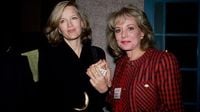Barbara Walters, a towering figure in American television journalism, is the subject of a new documentary, Barbara Walters: Tell Me Everything, which premiered on Hulu on Monday, June 23, 2025. This comprehensive film offers an intimate look at Walters’ extraordinary career, her groundbreaking achievements, and the personal challenges she faced along the way. Spanning five decades of broadcast history, the documentary not only chronicles Walters’ rise as a pioneering female journalist but also explores the complexities and contradictions that defined her life.
Director Jackie Jesko, who previously worked as a producer at ABC News, spearheaded the project with unprecedented access to ABC’s archival footage, encompassing thousands of hours of interviews spanning Walters’ 40-year tenure at the network. Jesko drew heavily from Walters’ 2008 autobiography, Audition, and a patchwork of interviews from various sources, including NPR and the Television Academy, to allow Walters to tell her own story in her own words. Jesko described the challenge of condensing such a vast career into a 90-minute film, remarking on the difficulty of capturing both the professional milestones and personal moments that shaped Walters’ legacy.
Walters’ career began humbly in the early 1960s at NBC’s Today show, where she was initially hired cheaply and relegated to writing copy for the “Today Girl” segment. Yet, her persistence and talent quickly earned her on-air segments, including a memorable report on a Paris fashion show and a day-in-the-life feature on Playboy bunnies. By 1971, Walters was the main attraction on Today, but her co-host Frank McGee imposed a rule that she could not ask questions until he had asked the first three, reflecting the male-dominated newsroom culture of the era. Following McGee’s death in 1974, Walters became the first woman to co-host a major daily network news program, a historic milestone achieved "literally over Frank McGee’s dead body," as Katie Couric candidly put it in the documentary.
Walters’ move to ABC News in 1976 marked another groundbreaking moment. She became the first female co-anchor of a national evening news program, earning a record $1 million salary. However, her partnership with veteran anchor Harry Reasoner was fraught with tension and hostility. Walters recalled, "I would walk into that studio, and Harry would be sitting with the stagehands, and they’d all crack jokes and ignore me. No one would talk to me. There was not a woman on the staff." She described this as "the most painful period in my life." Despite the rocky start, Walters thrived as a roving correspondent under ABC News chief Roone Arledge, who recognized her strengths and gave her the freedom to pursue exclusive stories worldwide.
One of Walters’ most notable achievements was her 1977 joint interview with Egyptian President Anwar Sadat and Israeli Prime Minister Menachem Begin during Sadat’s historic visit to Jerusalem, which cemented her reputation as a journalist capable of navigating complex political landscapes. Over the years, she became famous for her prime-time specials, where she interviewed an eclectic mix of world leaders, celebrities, and newsmakers with a blunt yet compelling style. From asking Barbra Streisand why she never fixed her nose to probing former President Richard Nixon about the infamous White House tapes, Walters’ interviews were must-watch television events.
Her 1998 interview with Monica Lewinsky, following the scandal involving then-President Bill Clinton, drew an astonishing 74 million viewers, making it the highest-rated TV interview special in 25 years, according to Variety. Oprah Winfrey, featured prominently in the documentary, praised Walters, saying, "She asked the question that nobody else had asked, and asked it in a way that always hit a nerve." Winfrey also discussed how Walters influenced her own decision not to have children, highlighting the sacrifices women often make in balancing career and family.
The documentary does not shy away from Walters’ personal struggles. It explores her fraught relationship with her adopted daughter Jacqueline, who declined to be interviewed for the film, and her complex, sometimes competitive, relationships with fellow female journalists such as Diane Sawyer and Connie Chung. Walters’ rivalry with Sawyer was described as a "cold war," fueled by professional competition and contrasting personalities. Yet, Sawyer later acknowledged a genuine friendship between them, and upon Walters’ death in 2022, she paid tribute to her as "a trailblazer, a singular force who opened the door for every woman in television news." Chung reflected on the challenges women faced in a male-dominated industry, recalling being caught in the crossfire between Walters and Sawyer and likening it to "what Tonya Harding did to Nancy Kerrigan."
Jesko and the film’s producers also address Walters’ willingness to cultivate relationships with powerful figures, including her friendship with controversial lawyer Roy Cohn, who helped her family during difficult times. Jesko noted that despite perceptions of transactional relationships, Walters remained loyal to Cohn even when it was no longer advantageous, testifying at his disbarment hearing late in his career.
Walters’ legacy extends beyond her interviews and groundbreaking roles. In 1997, she created The View, an all-female panel talk show that became a major platform for political and cultural discourse and launched the careers of numerous women in television. The documentary culminates with footage from Walters’ final appearance on The View in 2014, where Oprah Winfrey introduced a lineup of female journalists, including Sawyer, Couric, Cynthia McFadden, Savannah Guthrie, and Hoda Kotb, whom Walters proudly called her "legacy."
While the documentary celebrates Walters’ achievements, it also poses difficult questions about the ethical implications of her approach to journalism. A former ABC News producer candidly remarked, "I think Barbara would be friends with the devil if it would get the interview," referencing uncomfortable moments such as her 1989 meeting with Libyan dictator Moammar Gaddafi. The film acknowledges that Walters’ extreme dedication and competitiveness, while propelling her to success, also exacted a toll on her personal and family life.
Critics note that the documentary, while thorough and engaging, stops short of deeply exploring the broader changes in television journalism since Walters’ heyday. As Katie Couric observed, "There’s a certain feeling you get when you’re watching something knowing that everyone is watching the same thing at that very same moment. And that doesn’t exist anymore, and I think that’s when Barbara was the queen." Oprah Winfrey added that today, "there really is no place for a Barbara Walters interview now because everybody does their own interviews." Jesko echoed these sentiments, highlighting the fragmentation of the media landscape and the decline in public trust, lamenting the loss of a shared media reality where a single trusted figure could shape public discourse.
Jesko suggested that contemporary podcaster Alex Cooper might be the closest modern equivalent to Walters, given Cooper’s ability to attract huge audiences and ask deeply personal questions. Yet, the documentary underscores that the era of concentrated media attention, exemplified by Walters commanding 70 million viewers for a single interview, is unlikely to return.
As the industry evolves, the absence of women in prime-time network news remains notable. The documentary closes on a bittersweet note, acknowledging that none of the broadcast evening news shows in 2025 are hosted by women, following Norah O’Donnell’s replacement on CBS Evening News. Walters’ unparalleled talent for extracting information and eliciting confessions remains sorely missed in today’s fractured media environment.
Barbara Walters: Tell Me Everything offers a compelling portrait of a woman who transformed television journalism and opened doors for generations to come, even as it reveals the personal costs of her trailblazing path. Her story is a vivid reminder of a bygone era and the enduring impact of a singular television icon.


